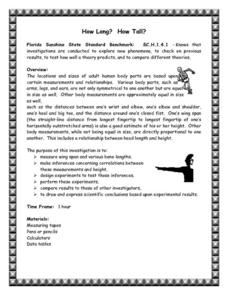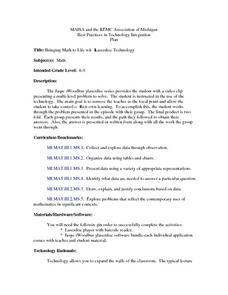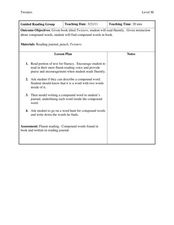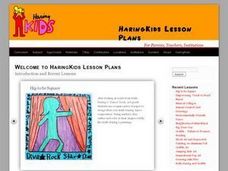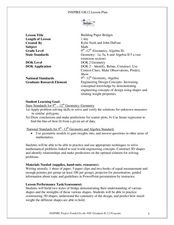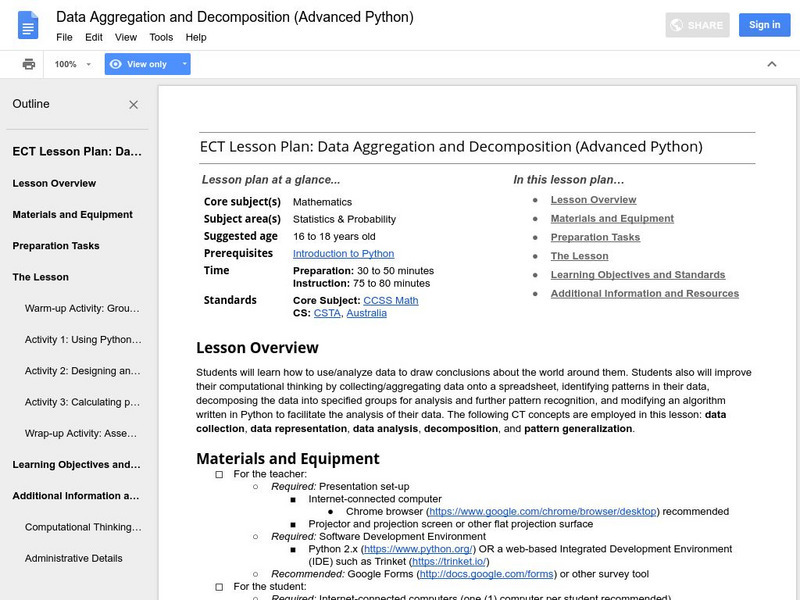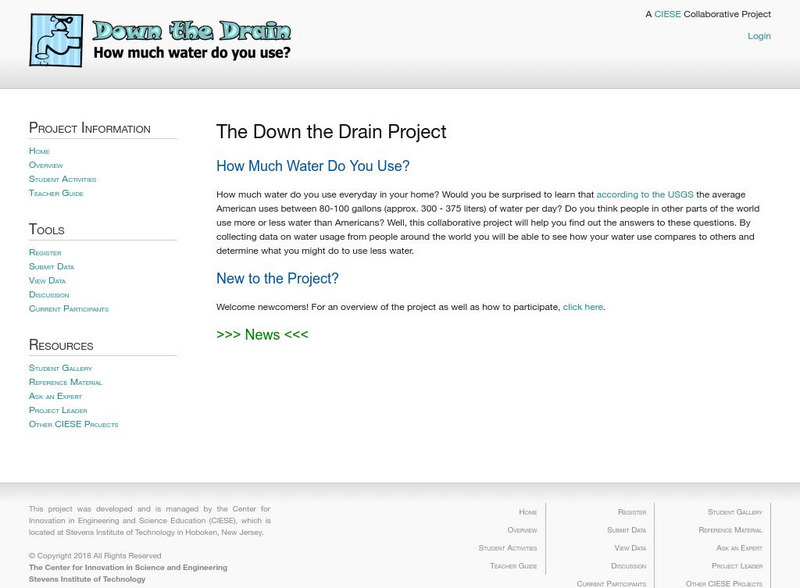Curated OER
How Long? How Tall?
Seventh graders investigate the parts of the human body and examine the symmetry of body parts like arms and legs. They measure the body parts and take individual height and weight to compare the quantities. Student examine whether the...
Curated OER
Standards And Science
Students study how standards are established in Science. They also look at the value of different perspectives with questions about ecological standards. The class creates its own standards for ecology with the help of a survey to obtain...
Curated OER
Aeronautics Propulsion
Students use the World Wide Web to access additional information needed to complete the activities on the forces on an airplane, the function of the stabilizer, and the calculation of Mach speed, temperature, pressure, and thrust.
Curated OER
Bringing Math to Life with Laserdisc Technology
Students explore various problems. They present their final results and explain the path they followed in order to obtain their answers. Students show their written work as well as orally explaining their work.
Curated OER
WorldWatcher Activity: Investigating Population and Carbon Emissions
Middle schoolers develop a population density visualization chart to begin the lesson. In groups, they use this information to compare to rates of carbon emissions for their country. They identify solutions to the problem and present...
Curated OER
OUtside Influence
Students identify factors that are important for brain functioning of learning. They observe the impact of interaction in mice. They also create their own experiment dealing with the mice. They analyze and share their results.
Curated OER
People and Parks in the U.S.A.
Fifth graders explore the National Parks in the United States. After locating specified states, 5th graders predict which states have the most National Parks. Given the population of each state, students determine the average acre per...
Curated OER
Sea Ice Research
Students study sea ice and its importance in climate and climate change. They discuss sea ice as a presence of a food source for marine animals in the arctic and complete a lab activity. After completing the lab, they watch a video...
Curated OER
The Diary of Anne Frank: Research Project on Concentration Camps during World War II
Eighth graders investigate the Holocaust and the persecution of specific ethnic groups in Europe during World War II.
Curated OER
What are Quarters Made of?
Students study the meaning, symbolism, and value of U.S. coins,
especially the quarter. They l research why in 1965 the U.S. Mint decided to
change the metal composition of the quarter to copper coated with zinc. In addition, they...
Curated OER
Relating Number of Insect Species to Water Quality
Students are asked to respond to questions such as:" Have there been surveys of the area to inventory the species?" (For example, for a wetland area, do they know what amphibians live there and how abundant they are?) Are there any...
Curated OER
Site Robbers
Fourth graders interview a Native American and write a newspaper article or letter that expresses concern about robbing archaeological sites.
Curated OER
Twisters
Students differentiate between the terms 'tornado watch' and 'tornado warning' and simulate the conditions that produce tornadoes. They read "Night of the Twisters" by Ivy Ruckman and conduct an experiment using two-liter plastic...
Curated OER
Using Scholastic News to Introduce the Net
Third graders log on to the net, type in the address for Scholastic and browse the subjects for the week. They select one area of interest and generate five interesting facts about the article.
Curated OER
Introduction to Keith Haring
Young scholars experience a dance club-like environment one would find in Haring's 1980's. They dress in 80's clothes and learn break dancing moves. They relate the experience to Haring's artwork and explain his influences.
Curated OER
CURRENT AND CLIMATE
Students study currents and how they have been used to plot courses for travel. They examine the ocean currents in both the Atlantic and Pacific and discuss their effect on local weather.
Curated OER
Saskatchewan's Population Distribution
Students explore landforms, vegetation, climate and population distribution in Saskatchewan. After discussing an atlas of Saskatchewan, students create their own relief map and climagraphs of Saskathewan. Using specified websistes,...
Curated OER
Mini-Sanitary Landfill
Second graders work in groups to bury a variety of trash items and arrange them in a mini-landfill. They predict which items will biodegrade and then keep records of what the items look like every ten days. Students consider how...
Curated OER
Construct with Solids
Students discover which properties of solids lend themselves to building a tower through hands on trial and error and observation of others as they are building. They write down the steps it took them to build the tower and label an...
Curated OER
Building Paper Bridges
Students construct a bridge that can hold 100 pennies. In this math lesson plan, students evaluate the strength of their bridges. They predict how much weight a bridge can hold based on its design.
Curated OER
Germany And The European Union
Tenth graders investigate the concept of the European Union. They spend time looking at the different characteristics that are common in respect to geography, culture, and governmental structures. The research is used in order to obtain...
Google
Google for Education: Data Aggregation and Decomposition (Python)
Students learn how to use and analyze data to draw conclusions about information collected from classmates. Then they use computational thinking by collecting and aggregating data onto a spreadsheet, identifying patterns in their data,...
Texas Instruments
Texas Instruments: Gemini Candy
In this activity, students work in groups to collect data and draw conclusions from random samples simulated by drawing tiles from a bag. They represent the data collected in the form of a triple bar graph.
Center for Innovation in Engineering and Science Education, Stevens Institute of Technology
Ciese: Down the Drain Project
Teachers can start this project at any time and no registration is required. Students collect data about water usage for themselves, their homes and their class. They analyze it, make predictions about it, and submit the data to the...
